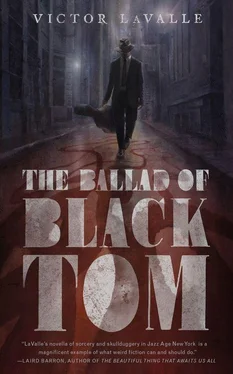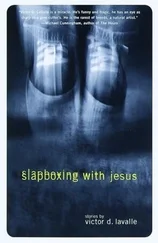Ma Att looked from the book, there in the case, and back to him. She seemed slightly disappointed.
“You weren’t tempted to look inside?” she asked.
“I charge more for that,” Tommy said.
She didn’t find him funny. She sniffled once, that’s all. Then she reached into the guitar case and slipped the book out. She moved so quickly the book hardly had a chance to catch even a single ray of sunlight, but still, as the book was pulled into the darkness of Ma Att’s home, a faint trail of smoke appeared in the air. Even glancing contact with daylight had set the book on fire. She slapped at the cover once, snuffing out the spark.
“Where did you find it?” she asked.
“There’s a place in Harlem,” Tommy said, his voice hushed. “It’s called the Victoria Society. Even the hardest gangsters in Harlem are afraid to go there. It’s where people like me trade in books like yours. And worse.”
Here he stopped. Mystery lingered in the air like the scent of scorched book. Ma Att actually leaned forward as if he’d landed a hook into her lip. But Tommy said no more.
“The Victoria Society,” she whispered. “How much would you charge to take me in?”
Tommy scanned the old woman’s face. How much might she pay? He wondered at the sum, but still he shook his head. “I’d feel terrible if you got hurt in there. I’m sorry.”
Ma Att watched Tommy Tester, calculating how bad a place this Victoria Society could be. After all, a person who trafficked in books like the little yellow one in her hand was hardly the frail kind.
Ma Att reached out and tapped the mailbox, affixed to the outside wall, with one finger. Tommy opened it to find his pay. Two hundred dollars. He counted through the cash right there, in front of her. Enough for six months’ rent, utilities, food and all.
“You shouldn’t be in this neighborhood when the sun goes down,” Ma Att said. She didn’t sound concerned for him.
“I’ll be back in Harlem before lunchtime. I wouldn’t suggest you visit there, day or night.” He tipped his cap, snapped the empty guitar case shut, and turned away from Ma Att’s door.
On the way back to the train, Tommy Tester decided to find his friend Buckeye. Buckeye worked for Madame St. Clair, the numbers queen of Harlem. Tommy should play Ma Att’s address tonight. If his number came up, he’d have enough to buy himself a better guitar case. Maybe even his own guitar.
“That’s a fine git-fiddle.”
Tommy Tester didn’t even have to look up to know he’d found a new mark. He simply had to see the quality of the man’s shoes, the bottom end of a fine cane. He plucked at his guitar, still getting used to the feel of the new instrument, and hummed instead of sang because he sounded more like a talented musician when he didn’t open his mouth.
The trip out to Queens last month had inspired Tommy Tester to travel more. The streets of Harlem could get pretty crowded with singers and guitar players, men on brass instruments, and every one of them put his little operation to shame. Where Tommy had three songs in his catalog, each of those men had thirty, three hundred. But on the way home from Ma Att’s place, he’d realized he hadn’t passed a single strummer along the way. The singer on the street might’ve been more common in Harlem and down in Five Points, or more modern parts of Brooklyn, but so much of this city remained — essentially — a bit of jumped-up countryside. None of the other Harlem players would take a train out to Queens or rural Brooklyn for the chance of getting money from the famously thrifty immigrants homesteading in those parts. But a man like Tommy Tester — who only put on a show of making music — certainly might. Those outer-borough bohunks and Paddys probably didn’t know a damn thing about serious jazz, so Tommy’s knockoff version might still stand out.
On returning from Ma Att’s place, he’d talked all this through with his father. Otis Tester, yet one more time, offered to get him work as a bricklayer, join the profession. A kind gesture, a loving father’s attempt, but not one that worked on his son. Tommy Tester would never say it out loud — it’d hurt the old man too much — but working construction had given his father gnarled hands and a stooped back, nothing more. Otis Tester had earned a Negro’s wage, not a white man’s, as was common in 1924, and even that money was withheld if the foreman sometimes wanted a bit more in his pocket. What was a Negro going to do? Complain to whom? There was a union, but Negroes weren’t allowed to join. Less money and erratic pay were the job. Just as surely as mixing the mortar when laborers didn’t show up to do it. The companies that’d hired Otis Tester, that’d always assured him he was one of them, had filled his job the same day his body finally broke down. Otis, a proud man, had tried to instill a sense of duty in his only child, as had Tommy’s mother. But the lesson Tommy Tester learned instead was that you better have a way to make your own money because this world wasn’t trying to make a Negro rich. As long as Tommy paid their rent and brought home food, how could his father complain? When he played Ma Att’s number, it hit as he dreamed it would, and he bought a fine guitar and case. Now it was common for Tommy and Otis to spend their evenings playing harmonies well into the night. Tommy had even become moderately better with a tune.
Tommy had decided against a return to Flushing, Queens, though. A hustler’s premonition told him he didn’t want to run into Ma Att again. After all, the book he’d given her had been missing one page, hadn’t it? The very last page. Tommy Tester had done this with purpose. It rendered the tome useless, harmless. He’d done this because he knew exactly what he’d been hired to deliver. The Supreme Alphabet. He didn’t have to read through it to be aware of its power. Tommy doubted very much the old woman wanted the little yellow book for casual reading. He hadn’t touched the book with his bare hands and hadn’t read a single word inside, but there were still ways to get the last sheet of parchment free safely. In fact that page remained in Tommy’s apartment, folded into a square, slipped right inside the body of the old guitar he always left with his father. Tommy had been warned not to read the pages, and he’d kept to that rule. His father had been the one to tear out the last sheet, and his father could not read. His illiteracy served as a safeguard. This is how you hustle the arcane. Skirt the rules but don’t break them.
Today Tommy Tester had come to the Reformed Church in Flatbush, Brooklyn; as far from home as Flushing, and lacking an angry sorceress. He wore the same outfit as when he went to visit Ma Att, his trooper hat upside down at his feet. He’d set himself up in front of the church’s iron-railed graveyard. A bit of theater in this choice, but the right kind of person would be drawn to this picture. The black jazz man in his frayed dignity singing softly at the burying ground.
Tommy Tester knew two jazz songs and one bit of blues. He played the blues tune for two hours because it sounded more somber. He didn’t bother with the words any longer, only the chords and a humming accompaniment. And then the old man with the fine shoes and the cane appeared. He listened quietly for a time before he spoke.
“That’s a fine git-fiddle,” the man finally said.
And it was the term— git-fiddle —that assured Tommy his hustle had worked. As simple as that. The old man wanted Tommy to know he could speak the language. Tommy played a few more chords and ended without flourish. Finally he looked up to find the older man flushed, grinning. The man was round and short, and his hair blew out wildly like a dandelion’s soft white blowball. His beard was coming in, bristly and gray. He didn’t look like a wealthy man, but it was the well-off who could afford such a disguise. You had to be rich to risk looking broke. The shoes verified the man’s wealth, though. And his cane, with a handle shaped like an animal head, cast in what looked like pure gold.
Читать дальше












